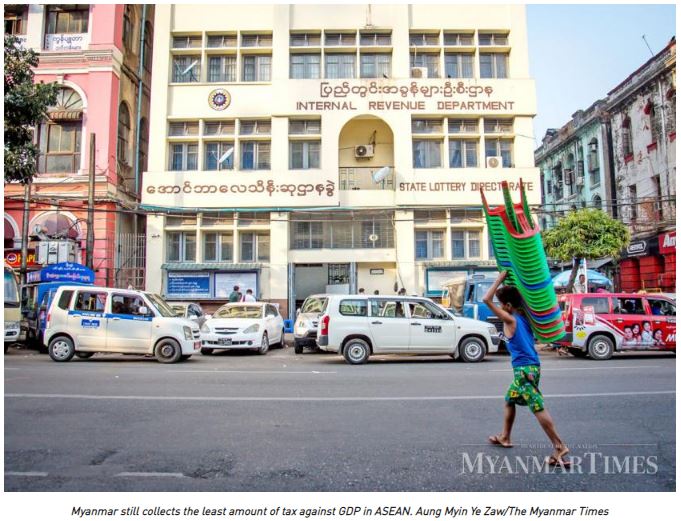Myanmar: Tax collection procedures improving, but more progress needed
As the tax to GDP ratio for Myanmar is lower than that of its regional peers, successive governments have prioritised more efficient tax collection.
Efforts to reform tax collection began in 2012 under former president U Thein Sein. The aim of the effort was to put in place a modern tax administration system.
The first phase of the tax reform plan was carried out from 2012 to 2017, with the Internal Revenue Department (IRD) drafting regulations for tax reform. During the period, the country switched from the official assessment system (OAS) of paying taxes to the self-assessment system (SAS). In tax administration reform, the department changed from a paper-based administration system to IT-based system.
The adoption of the SAS was one of the main recommendations from the International Monetary Fund and World Bank in terms of change in Myanmar’s tax system.
The IRD expects tax collection from SAS taxpayers to be between 80 to 90 percent of total tax income in 2020. Currently though, just over 3000 taxpayers have registered under the SAS.
“The change in assessment systems required a change in people’s mindsets and some had difficulty with this. The department’s human resources are limited at present and the transition in assessment systems has not been something easy to do,” said IRD Director General U Min Htut.
Improvements needed
Some business owners see the changes in the tax system as a great improvement over the past. “The concept of taxes is becoming more familiar to people. In the past, you didn’t have to pay beyond the price of what you ate in a restaurant, but now, you have to pay commercial tax in many restaurants. People are becoming familiar with it,” said U Tin Latt, executive council member of Union of Myanmar Federation of Chambers of Commerce and Industry (UMFCCI).
But much more needs to be done to raise tax revenues. “In order for the people to pay [taxes] there should be motivation. And in order for there to be motivation, convenient and clear payment methods should in place. If the tax system becomes convenient and clear, then more taxes can be collected than is possible today,” said U Tin Latt.
U Moe Kyaw, Deputy Chair of the Myanmar Institute of Certified Public Accountants, reckons “the relationship between the taxpayer and tax authorities needs to improve. The taxpayer and the tax collector need to trust each other. Now, some taxpayers are still wary of revealing their actual earnings for fear of being taxed further. Meanwhile, the authorities are typically on the lookout for tax evasion. This has to change for things to move forward,” he said.
Meanwhile, with the first phase of taxation reform already in motion, the second phase is set for this year to 2022.
According to the IRD’s report on the second phase of taxation reform, arrangements are being made to launch a tech-based tax management system next year.
The plan is to adopt an integrated tax administration system (ITAX) where people can register as tax payers and pay their taxes online via a web portal or mobile application.
“ITAX will have event calendars so, if taxes aren’t paid on time, remainders will be issued. This will make taxpaying more streamlined,” said U Min Htut.
Raising taxes
Tax money is the government’s main source of income. In 2012, the tax to GDP ratio was only 3 pc and now, it is 8pc. That is still the lowest among ASEAN countries, and the government’s target is to increase it to 15 pc.
Myanmar’s Sustainable Development Plan 2018 to 2030 calls for the increase of internal taxes as one of its main strategies. The strategy calls for the increase of tax revenues and collection, better transparency in the tax system and the elimination of corruption in order to boost socio-economic development and eradicate poverty.
Yet, in the UMFCCI Business Sentiment Survey for this year, the tax burden was described as one of the three main reasons for the weak economy.
“The government is focusing on collecting more taxes. This would be a burden rather than a boon,” said U Moe Kyaw, executive director of Myanmar Marketing Research and Development Co Ltd.
In the past, big businesses have proposed that tax rates be lowered in meetings with State Counsellor Daw Aung San Suu Kyi, but she has said, “Economists don’t agree with tax reductions as they say it may not be beneficial. The government has to listen to all sectors and take in into account, not just businesses. We have to look at the requirements of the entire nation.”
Source: https://www.mmtimes.com/news/tax-collection-procedures-improving-more-progress-needed.html


 English
English




